When confronted with an arrest, especially for a charge as severe as domestic battery, the situation can become heated and emotionally charged. In the heat of the moment, you might consider resisting arrest, but what happens if you do? This guide will help you understand the potential consequences.
What Happens if You Resist Arrest for Domestic Battery?
In the course of this guide, we’ll go through the following essential points:
- What constitutes “resisting arrest”
- The legal consequences of resisting arrest in Illinois
- How resisting arrest can affect a domestic battery case
- The role of a defense lawyer when you’re accused of resisting arrest
Here’s a closer look at each.
What Constitutes “Resisting Arrest”
Resisting arrest goes beyond simply saying “no” to the police officer. Any physical action to evade arrest—like running away or struggling against the officer—falls under this category. Even passive resistance, such as going limp and refusing to cooperate, can be considered resisting arrest.
Related: Does domestic battery stay on your record forever?
Legal Consequences of Resisting Arrest in Illinois
In Illinois, resisting or obstructing a peace officer carrying out an arrest is a Class A misdemeanor. If convicted, you could face up to one year in jail, a fine of up to $2,500, or both. And that’s in addition to any other charges you might be facing, including domestic battery.
How Resisting Arrest Can Affect a Domestic Battery Case
Resisting arrest can complicate your domestic battery case. It might impact how the court views your character, potentially leading to stricter bail conditions or affecting a jury’s perception of you. The added charge also means more potential legal penalties if you’re convicted.
The Role of a Defense Lawyer When You’re Accused of Resisting Arrest
When you’re accused of resisting arrest on top of a domestic battery charge, having a skilled defense lawyer on your side is crucial. They’ll help you understand the charges, advise you on the best course of action, and defend your rights in court.
Related: How to defend against false allegations of domestic battery in Illinois
FAQ About Resisting Arrest and Domestic Battery
Check out these commonly asked questions about resisting arrest and domestic battery. If you don’t see the answers here, please call our office and we’ll get you the information you need.
Does resisting arrest automatically mean an additional jail sentence?
Often, resisting arrest means you’ll have a tougher time in the legal system. A lot depends on your case specifics, your criminal history, and the skills of your defense lawyer.
Can a lawyer help if I’ve already resisted arrest and been charged?
Absolutely. A skilled defense lawyer can challenge the validity of the resisting arrest charge and work towards a favorable outcome.
What can I do if the police used excessive force during my arrest?
If you believe the police used excessive force during your arrest, you should discuss it with your attorney. They can evaluate the situation and guide you on the next steps.
Related: What to do if you’re arrested for domestic battery
Facing an arrest, particularly for domestic battery, is a challenging situation. If you’ve resisted arrest, it can further complicate matters. However, no matter how complicated your case may seem, remember that you still have rights. Engaging an experienced defense lawyer can make a significant difference in your case. They will navigate these complexities, defend your rights, and work towards achieving the best possible outcome for you.
Do You Need to Talk to an Attorney About Domestic Battery Defense?
If you need to talk to a domestic battery defense attorney in Illinois, we’re here to help. Call us at 847-920-4540 now – we’ll be happy to give you a free consultation and talk to you about your options.







Leave A Comment
You must be logged in to post a comment.